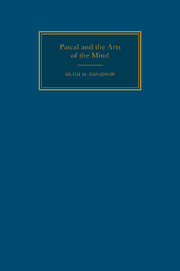
-
Select format
-
- Publisher:
- Cambridge University Press
- Publication date:
- 26 January 2010
- 24 September 1993
- ISBN:
- 9780511627620
- 9780521331937
- 9780521032629
- Dimensions:
- (216 x 138 mm)
- Weight & Pages:
- 0.451kg, 286 Pages
- Dimensions:
- (216 x 138 mm)
- Weight & Pages:
- 0.374kg, 288 Pages
- Subjects:
- History of Philosophy, Literature, Area Studies, Literary Theory, European Literature, European Studies, Philosophy
- Series:
- Cambridge Studies in French (46)
You may already have access via personal or institutional login- Subjects:
- History of Philosophy, Literature, Area Studies, Literary Theory, European Literature, European Studies, Philosophy
- Series:
- Cambridge Studies in French (46)
Book description
This 1993 book studies the ways in which Pascal posed and solved intellectual problems in three very different areas of his work: mathematics and mathematical physics, religious experience and theology, communication and controversy. Hugh Davidson shows how three of the classical 'liberal arts', rhetoric, dialectic and geometry, pervade Pascal's method as liberating and guiding influences in his search for truth. They appear throughout his production and are used and adapted with great skill both in his attacks on tradition in mathematics and physics and in his defences of tradition in the sphere of religion and morality. Professor Davidson throws light on both the diversity and the unity of Pascal's thought, and places it in the context of other seventeenth-century innovations in the use of traditional disciplines.
Contents
Metrics
Full text views
Full text views help Loading metrics...
Loading metrics...
* Views captured on Cambridge Core between #date#. This data will be updated every 24 hours.
Usage data cannot currently be displayed.
Accessibility standard: Unknown
Why this information is here
This section outlines the accessibility features of this content - including support for screen readers, full keyboard navigation and high-contrast display options. This may not be relevant for you.
Accessibility Information
Accessibility compliance for the PDF of this book is currently unknown and may be updated in the future.


